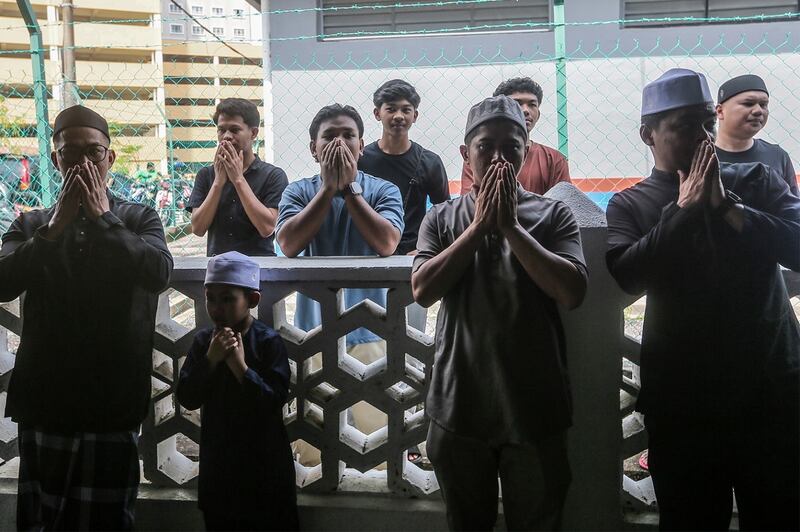The rare public caning of a man under Sharia laws in the religiously conservative Malaysian state of Terengganu was criticized by rights advocates as “inhuman” and a step backward in this multi-ethnic country.
Mohd Affendi Awang, a 42-year-old carpenter convicted of repeatedly committing the Islamic crime of khalwat, was punished with six strokes of a rattan cane at a local mosque on Friday.
In Sharia law, khalwat refers to an offense when a man and a woman who are not related or married are caught alone together.
A local sharia court found Mohd Affendi, a father of five, guilty of spending time with a woman who was not his wife or close relative on June 16, according to local media. He pleaded guilty to the offense.
Islam is the dominant religion in multi-ethnic and multi-faith Malaysia. The country has a dual justice system made up of federal courts and Sharia courts that function separately.
Friday’s caning was only the second public caning in Malaysia under Sharia law since 2018.
Terengganu is where the Malaysian Islamic Party (PAS), a key partner in the nation’s opposition bloc, controls the state legislature.

The public caning of Mohd Affendi adhered to guidelines ensuring minimal physical harm, local officials said.
“The caning was carried out by a trained individual using a moderate method that does not injure or bruise the offender’s skin or body,” Muhammad Hariz Md Yusoff, deputy president of the Malaysian Lawyers’ Association, said during a press briefing.
But human rights advocates criticized the method of punishment, calling it “inhuman and degrading.”
The public caning is "an affront to human dignity and violates a basic principle enshrined in both international law and the Federal Constitution of Malaysia," Malaysia's Human Rights Commission (Suhakam) said in a statement issued on Dec. 19, ahead of the carpenter's caning.
Public caning undermines the nation’s commitment to human rights, the country’s largest group of lawyers said.
"Such punishments strip individuals of their dignity," Malaysian Bar president Mohamad Ezri Abdul Wahab said in a statement on Thursday. "While we acknowledge the significance of upholding laws that preserve public morality, these punishments must align with Malaysia's commitments to international standards."
Public caning is an act of utmost cruelty designed to humiliate as well as physically injure the individual, said Josef Benedict, Asia-Pacific researcher for Civicus Monitor.
"Flogging sentences is a flagrant violation of international human rights law," Benedict told BenarNews.
“The authorities must immediately repeal the law which imposes these punishments, which constitute cruel, inhuman and degrading treatment and may amount to torture.”
Rare event
On Friday, a crowd of around 90 people, including state Islamic authorities, mosque officials, and selected media personnel, were allowed to observe the caning of Mohd Affendi.
Dressed in a red prison uniform and a face mask, the carpenter remained composed as Sharia court officials led him into the mosque for the caning.
He underwent a 20-minute health check and had the charges read to him before the two-minute caning commenced, witnesses told BenarNews.
“As soon as he arrived, he was taken to a special room,” a local reporter who witnessed the event said. “According to standard operating procedures, the caning wasn’t carried out with the hand raised fully – only halfway.”
“There was no visible expression or sound from the offender. The cane used had a diameter of 1.2 inches and was softer than those used in civil cases,” he said.

Under Terengganu’s Sharia law, repeat offenders of khalwat can face up to six strokes of the cane, fines of up to RM 5,000 ($1,114), or imprisonment of up to three years.
Local Sharia courts found Mohd Affendi guilty of violating the same law three times. For his second offense, the court in February sentenced him to four cane strokes behind closed doors apart from paying a fine of RM 3,000 (U.S. $670), local media reported.
Outside the mosque on Friday, more than 100 individuals, including curious onlookers and school-aged children, gathered to witness the event.
Public reactions to Friday's public caning were mixed. Some supporters said it was necessary to uphold Islamic morals.
“As a Muslim, I fully support public caning. It serves as a deterrent and a lesson for society,” resident Baharuddin Ambak told BenarNews.
“The case involves a repeat offender convicted of khalwat … [his] third offense,” Wan Mohd Yusof Wan Chik, an Islamic scholar at Universiti Sultan Zainal Abidin, told BenarNews. “The individual is somewhat defiant, and this punishment was publicly announced due to the repeated nature of the offense.”
In 2018, two women were publicly caned in Terengganu after pleading guilty to charges of attempting to have sex in a car.
That public punishment at a courthouse angered human rights activists, but it was defended by PAS leaders as a lawful and necessary measure under Islamic principles.
Terengganu, the country’s seventh-largest state, is a PAS political stronghold. In the last general elections, PAS secured all eight local parliamentary seats.
Perikatan Nasional, a political coalition of which PAS is a member, won all 32 state assembly seats, giving it complete control over decisions related to state matters, including Sharia laws.
